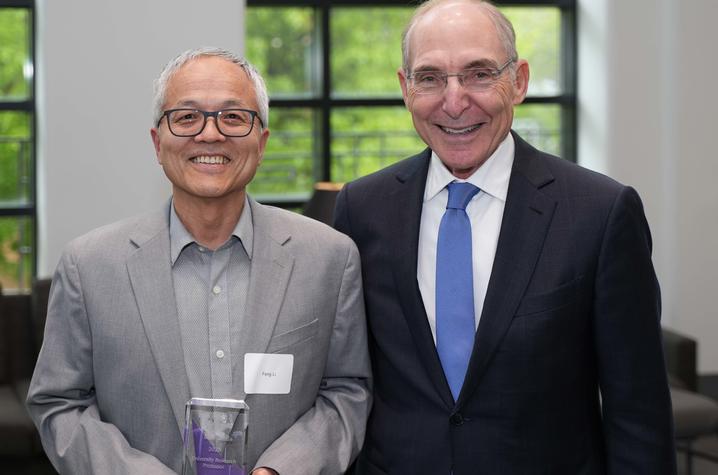Feng Li honored as a 2023-24 University Research Professor

Feng Li, D.V.M., Ph.D., the William Robert Mills Chair in Equine Infectious Disease at the Martin-Gatton College of Agriculture, Food and Environment Gluck Equine Research Center, is one of 16 University Research Professors for 2023-24. The University Research Professorships honor faculty members who have demonstrated excellence that addresses scientific, social, cultural and economic challenges in our region and around the world.
College leadership develop criteria for excellence within their area of expertise and then nominate faculty who excelled at these criteria. Each University Research Professor receives a one-year award of $10,000.
“This great honor certainly recognizes our research in equine and animal infectious diseases,” said Li. “It will motivate us to conduct cutting-edge research toward developing effective vaccines against newly emerging viral diseases, which can protect horses and other agricultural animals in Kentucky and beyond.”
Li’s research focuses on rapid detection and characterization of viral pathogens emerging in horses, as well as in the animal-human interface. The other component of his work is to develop next generation vaccines and antiviral therapeutic strategies that can well protect humans and agricultural animals including horses.
Prior to joining UK in June of 2020, Li spent 15 years at South Dakota State University. The Gluck Center’s internationally recognized equine research and a passion for horses brought Li to Lexington.
“Horses can accompany their humans for up to 20-40 years in their life, which is truly amazing and motivates me study their health and well-being from infectious disease/one health perspective,” said Li.
Li’s research has assisted in the discovery of the novel influenza D virus, detected in global cattle populations across the four major continents (Africa, Europe, Asia and America). Influenza D has been viewed as a potential health threat to humans, as the virus possesses genetic traits that can enable it to cross the species barrier for infection of humans.
In some of his latest research, Li is working with a team to develop a safe and effective vaccine to protect foals from the recently identified rotavirus B in horses. There are currently no vaccines or therapeutics available to control or prevent this emerging disease.
Credits
Words: CE Huffman (Public Relations & Strategic Communication)
Photo: Jeremy Blackburn (Research Communications)

